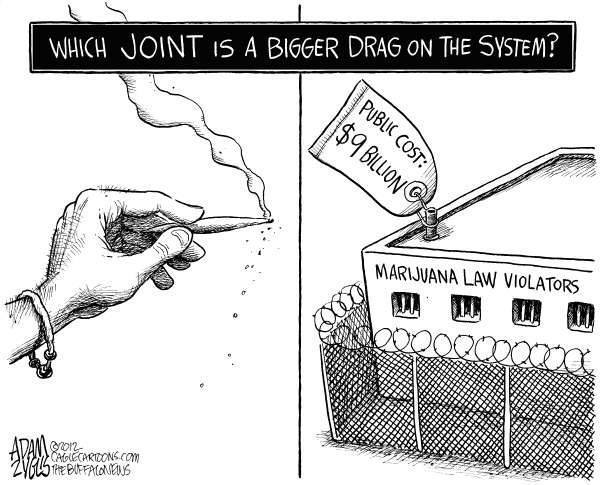Enforcing Marijuana Laws Is Costing Americans Millions

By:
The War on Drugs has been defined by long and costly battles, waged against non-violent offenders in the name of criminal justice. But as the legalization movement gains momentum at the state level, the national debate on marijuana has taken a new, more accepting tone. That's because it makes sense: marijuana isn't the dangerous, addictive drug that former administrations have made it out to be, and so it seems counterintuitive that we would continue to treat it as such throughout the criminal justice system.
 The Buffalo News
The Buffalo News
This comic from Adam Zyglis at the Buffalo News perfectly illustrates that point, calling attention to the enormous financial toll the United States incurs for enforcing marijuana-related crimes. The number—$9 billion per year—is striking, both for its size and wide-ranging social impact. Not only does it cost a lot of money to keep these non-violent drug offenders behind bars, but it also contributes to the rising incarceration rate in this country—and that's to say nothing about the effect it has on offenders and their families.
The Marijuana Policy Project, a nonprofit organization that advocates for legalization and decriminalization, came up with the $9 billion figure. In its fact sheet on marijuana prohibition, the group comments on the relationship between Drug War-era policies respecting marijuana enforcement and the country's mass incarceration problem.
"In 2006, the last year for which data is available, federal government figures indicated that there were more than 41,000 Americans in state or federal prison on marijuana charges, not including those in county jails," MPP wrote. "That's more than the number imprisoned on all charges combined in eight individual European Union countries."
What's more, states that have passed legalization or decriminalization measures have seen huge profits. Freeing up state prison systems allows them to allocate law enforcement resources more effectively, and as Colorado has already demonstrated, tax revenue from recreational and medical marijuana sales appears to be a strong incentive for reform. In the year since Colorado legalized pot, the state brought in more than $50 million from taxes.
President Obama has made concerted efforts to raise public attention to the importance of criminal justice reform, citing a variety of issues that have metastasized throughout the justice system in the past two decades. One example of a common sense solution to some of these issues, he suggested, would be decriminalization.
"I'd separate out the issue of criminalization of marijuana from encouraging its use," Obama told Vice Media co-founder Shane Smith earlier this year. "I think there's no doubt that our criminal justice system, generally, is so heavily skewed towards cracking down on non-violent drug offenders that it has not just had a terrible effect on many communities—particularly communities of color—rendering a lot of folks unemployable because they got felony records, disproportionate prison sentences. It costs a huge amount of money to states and a lot of states are figuring that out.
"We may be able to make some progress on the decriminalization side. At a certain point, if enough states end up decriminalizing, then Congress may then reschedule marijuana."
Here's to hoping.
